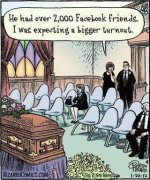
 Loneliness In Britain Has Escalated From Personal Misfortune Into A Social Epidemic
Loneliness In Britain Has Escalated From Personal Misfortune Into A Social EpidemicImagine Britain in the grip of a chronic illness that was causing widespread misery, costing the country millions in lost days at work, and doing more harm to those affected than smoking fifteen cigarettes a day or being obese. There would be calls for immediate action.
That is exactly the impact that loneliness is having. The evidence suggests that loneliness increases the risk of premature death by about a third, as the NHS will be highlighting later this week. But because it is so often hidden from sight, it is too easy to ignore. The damage it is doing right now is so profound that we have to respond quickly. Fortunately, the cost of effective action is not high. The price of inaction is enormous.
We have been studying the evidence over the past year as co-chairs of the Jo Cox Loneliness Commission. It is now clear that none of us is immune. As Jo herself said, “young or old, loneliness doesn’t discriminate.”
For some, its phases are acute but fleeting. For others, chronic and debilitating. The triggers can be anything from losing a loved one, to major changes at work or in our home lives. Loneliness surrounds us, from the quiet child in class to the high-powered executive too busy to engage in meaningful conversation, from the new mum to the family carer. It hides in plain sight.
We have been here before. For a long time, we saw positive mental health as the norm and mental illness as an aberration. It turned out that wasn’t true. The same applies to loneliness.
For individuals, loneliness can be hugely draining emotionally. There’s a reason why misbehaving toddlers are sent alone to the ‘naughty corner’ and why solitary confinement is used on prisoners as a punishment and torture technique.
Mentally, loneliness results in anxiety and stress, insomnia and depression, dementia and neurodegenerative disease. Physically, it can lead to high blood pressure, cardiovascular disease, strokes, and diabetes. Lonely people visit GPs more often, stay longer when in hospital and find it harder to recover afterwards.
As families, loneliness can rob us of perspective and cause our closest bonds – our safety nets – to fray.
It undermines community cohesion as people disengage, forgetting that we have more in common than that which divides us, receding into their respective corners in a downwards spiral of withdrawal.
And it damages our national economy, to the tune of £32bn per annum.
The evidence is clear: loneliness is toxic. And the problem is getting worse by the day.
We are living alone more, often moving away from family, and we work alone at home more too. We spend a greater proportion of our day by ourselves than we did ten years ago. Many of the institutions that once brought us together are fading, as each week another church or pub is converted into flats. On-line ‘friends’ replace real ones. The professionals, whether GPs, carers or church leaders, tell us they now have to confront the damage done by loneliness on a daily basis.
We can’t leave it up to them. All of us need to make tackling loneliness our business. Starting a conversation each day in your neighbourhood can be a radical act of community service. Whether it be in the doctor’s waiting room or the supermarket queue, it really is good to talk. We walk the same streets, so let’s not live in different worlds.
We learn from National Rail, on whose tracks hundreds of desperate people commit suicide every year, that just saying hello or asking someone on the platform about the weather could avert another tragic death.
So, let’s try to break out of the routine journey that is head-down, headphones-in, not a word spoken from home to work, and have a quick chat with a fellow passenger. When we get home, let’s phone an older relative or check on a neighbour who may be lonely but too proud or embarrassed to say so.
On Friday we will be publishing the report of the Jo Cox Loneliness Commission.
Central to our recommendations is the need for ministers to make tackling loneliness a priority at all levels of government. Yes, it will cost some money but, like all preventive interventions, will save far more in the long run.
We can’t afford not to act. Loneliness in Britain has escalated from personal misfortune into a social epidemic.
It doesn’t have to be this way. The problem is solvable. If we were all to play our part in strengthening the increasingly thin ties between us we could build a less lonely Britain.
As MPs, working to continue Jo’s work on this has been the greatest privilege of our professional lives. She pictured a country where nobody need feel isolated from the rest of society unless they choose to. Now it’s down to the rest of us to make that vision a reality.
https://www.msn.com/en-gb/health/mi...ocial-epidemic/ar-BBGu44c?ocid=ob-fb-engb-667
In continuation of the previous thread: https://forums.overclockers.co.uk/t...-you-as-smoking-15-cigarettes-a-day.18169063/
In the end of the day, it looks like social media and personal computers don't help, actually they do enough harm to the population, too.




